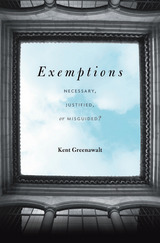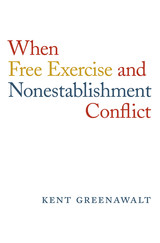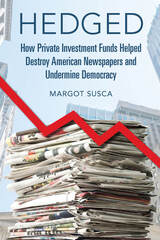
Should laws apply equally to everyone, or should some individuals and organizations be granted exemptions because of conflicting religious or moral convictions? In recent years, this question has become intensely controversial in America. The Supreme Court’s ruling on same-sex marriage, in particular, has provoked barbed debates about legal exemptions. At the core of these debates lies the question of whether basic values of equality and nondiscrimination are at odds with the right to live according to one’s religious beliefs.
In Exemptions: Necessary, Justified, or Misguided? Kent Greenawalt draws on his extensive expertise to place same-sex marriage and other controversies within a broader context. Avoiding oversimplification and reflecting a balanced consideration of competing claims and harms, he offers a useful overview of various types of exemptions and the factors that we should take into account when determining the justice of a particular exemption.
Through a close study of several cases, from doctors who will not perform abortions to institutions that do not pay taxes, Greenawalt demonstrates how to weigh competing values without losing sight of practical considerations like the difficulty of implementing a specific law. This thoughtful guide to exemptions will prove an invaluable resource as America struggles to come to terms with Obergefell v. Hodges, Burwell v. Hobby Lobby, and similar controversies. Exemptions shows how to reach the most just and desirable legal conclusions by respecting those who wish to live according to different fundamental values.

Rooted in Western classical and medieval philosophies, the natural law movement of the last few decades seeks to rediscover fundamental moral truths. In this book, prominent thinkers demonstrate how natural law can be used to resolve a wide range of complex social, political, and constitutional issues by addressing controversial subjects that include the family, taxation, war, racial discrimination, medical technology, and sexuality.
This volume will be of value to those working in philosophy, political science, and legal theory, as well as to policy analysts, legislators, and judges.

The First Amendment to the United States Constitution begins: “Congress shall make no law respecting an establishment of religion or prohibiting the free exercise thereof.” Taken as a whole, this statement has the aim of separating church and state, but tensions can emerge between its two elements—the so-called Nonestablishment Clause and the Free Exercise Clause—and the values that lie beneath them.
If the government controls (or is controlled by) a single church and suppresses other religions, the dominant church’s “establishment” interferes with free exercise. In this respect, the First Amendment’s clauses coalesce to protect freedom of religion. But Kent Greenawalt sets out a variety of situations in which the clauses seem to point in opposite directions. Are ceremonial prayers in government offices a matter of free exercise or a form of establishment? Should the state provide assistance to religious private schools? Should parole boards take prisoners’ religious convictions into account? Should officials act on public reason alone, leaving religious beliefs out of political decisions? In circumstances like these, what counts as appropriate treatment of religion, and what is misguided?
When Free Exercise and Nonestablishment Conflict offers an accessible but sophisticated exploration of these conflicts. It explains how disputes have been adjudicated to date and suggests how they might be better resolved in the future. Not only does Greenawalt consider what courts should decide but also how officials and citizens should take the First Amendment’s conflicting values into account.
READERS
Browse our collection.
PUBLISHERS
See BiblioVault's publisher services.
STUDENT SERVICES
Files for college accessibility offices.
UChicago Accessibility Resources
home | accessibility | search | about | contact us
BiblioVault ® 2001 - 2024
The University of Chicago Press









